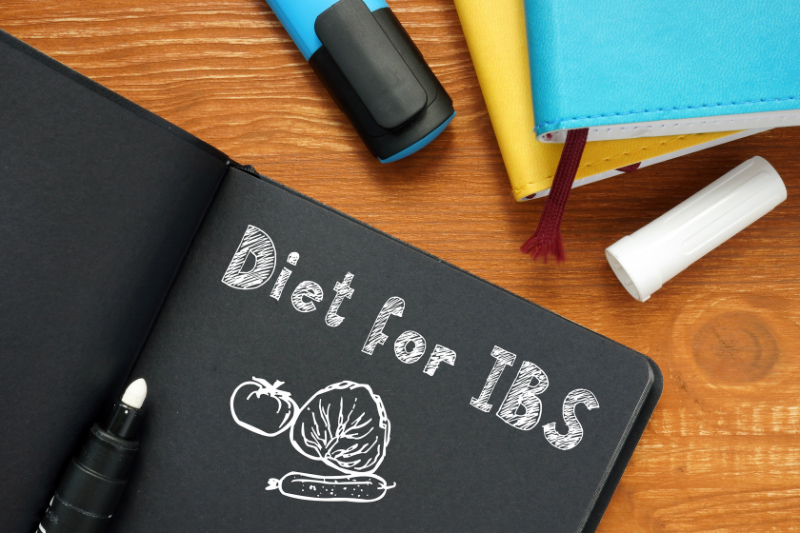- @admin123x
- 0 Comments
Increase fiber intake
Fiber can help with constipation in IBS by softening stools and making them easier to pass. The recommended daily amount of fiber for adults is 22 to 34 grams.1,2
There are two types of fiber:
- Soluble fiber, found in beans, fruit, and oats, which is more effective for IBS symptoms.1
- Insoluble fiber which is found in whole grains and vegetables.1
NOTE: To avoid gas or bloating, add fiber to your diet slowly, about 2 to 3 grams a day, to give your body time to adjust.1
Follow the FODMAP diet
You can try a low FODMAP diet to help with IBS. FODMAPs are certain carbs that are hard to digest, found in some fruits, vegetables, dairy, grains, and sweeteners.1
Foods with FODMAPs include1,2:
- Fruits like apples, pears, and watermelon
- Vegetables like onions, garlic, and beans
- Dairy like milk, yogurt, and cheese
- Wheat, rye, and foods with high-fructose corn syrup
You can try this diet for a few weeks. If it helps, you can slowly add back some FODMAP foods to see which ones you can tolerate.1
Avoid eating gluten
Try eating legume seeds
Legume seeds, like beans and lentils, are packed with protein, vitamins, minerals, and fiber, making them a great plant-based protein source, especially for vegetarians and vegans.
However, they can cause digestive issues like bloating and gas due to certain compounds. To make them easier to digest, it’s best to soak or cook them properly. For people with IBS, lentils may be a better choice since they’re easier to tolerate, especially when soaked or pressure-cooked.2
Track your caffeine intake
Caffeine, especially in coffee, can affect your stomach and bowels, and may worsen IBS symptoms. If you have IBS, pay attention to how caffeine affects you. If it causes problems, limit your intake to no more than 400 mg a day.3
Remember, caffeine is also in tea, energy drinks, soda, chocolate, and some pain relievers, so be sure to check labels and keep track of your total intake.3
Cut back on spicy food
Spicy foods can worsen IBS symptoms like stomach pain and heartburn. Eating spicy foods often, especially more than 10 times a week, may increase the risk of IBS, particularly in women.3
If spicy foods seem to trigger your IBS symptoms, it’s best to cut back or avoid them. Also, foods like onion and garlic, which contain certain triggers, should be monitored. 3
Limit your fat intake
Dietary guidelines for IBS:
If you have IBS, it’s helpful to eat at regular times and avoid skipping meals or going too long without eating. Try not to eat big meals or eat too late at night. It’s also good to take your time, sit down while eating, and chew your food well.3
Conclusion
To manage IBS, try adjusting your diet by adding more fiber, avoiding gluten, or following a low-FODMAP diet. Pay attention to how certain foods like fatty, spicy, or caffeinated items affect your symptoms. Eating regular, smaller meals and staying mindful of your food choices can help ease discomfort and improve gut health.
References:
- National Institute of Diabetes and Digestive and Kidney Diseases. Irritable Bowel Syndrome: Eating, Diet, and Nutrition. National Institutes of Health. Updated April 2021. Available from: https://www.niddk.nih.gov/health-information/digestive-diseases/irritable-bowel-syndrome/eating-diet-nutrition. Accessed January 20, 2025.JAMA. 2021;325(9):865-877.
- Radziszewska M, Smarkusz-Zarzecka J, Ostrowska L. Nutrition, Physical Activity and Supplementation in Irritable Bowel Syndrome. Nutrients. 2023;15(16):3662. Published 2023 Aug 21. doi:10.3390/nu15163662
- Cozma-Petruţ A, Loghin F, Miere D, Dumitraşcu DL. Diet in irritable bowel syndrome: What to recommend, not what to forbid to patients!. World J Gastroenterol. 2017;23(21):3771-3783. doi:10.3748/wjg.v23.i21.3771

